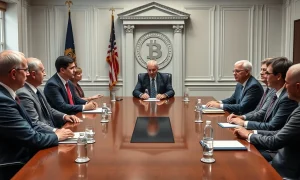Financial markets reeled as President Donald Trump escalated his battle with the Federal Reserve, claiming to have fired Governor Lisa Cook in an unprecedented challenge to central bank independence that immediately weakened the dollar and rattled global investors.
Fed Independence Under Direct Attack
President Trump’s Tuesday evening announcement marked the most severe threat to Fed independence in modern history. Consequently, investors immediately reacted by selling US government bonds. The 30-year Treasury yield jumped 0.06 percentage points to 4.92%. Meanwhile, the dollar slipped 0.15% against major currencies. Gold, traditionally a safe haven, climbed 0.4% to $3,388.60 per ounce.
Legal Battle Over Fed Authority
Governor Cook defiantly refused to resign, setting the stage for a constitutional showdown. She maintains her innocence regarding mortgage fraud allegations. Importantly, the legal precedent remains unclear regarding presidential authority to remove Fed governors. Financial analysts caution that any policy decisions made by Cook during this period could face legal challenges if courts ultimately side with Trump.
Market Reactions and Analyst Perspectives
Market reactions remained relatively contained initially. However, currency analysts warn of potential significant dollar weakening if the Fed independence erosion continues. Lee Hardman of MUFG noted the modest sell-off reflects legal uncertainty. Wall Street equities eventually recovered from early volatility, with both S&P 500 and Nasdaq closing 0.4% higher.
Monetary Policy Implications
The confrontation occurs at a critical monetary policy juncture. The Fed has maintained rates at 4.25-4.5% since December. Traders expect September rate cuts amid weakening employment data. Trump continues demanding rates as low as 1%, creating additional pressure on Fed leadership. Furthermore, two Trump-appointed rate-setters already advocate immediate easing.
Historical Context and Precedent
No modern president has successfully removed a sitting Fed governor. The Federal Reserve Act provides governors 14-year terms specifically to insulate them from political pressure. This move represents Trump’s second Fed appointment opportunity within a month following Stephen Miran’s nomination to replace Adriana Kugler.
Potential Outcomes and Scenarios
Legal experts anticipate prolonged court battles regardless of the eventual outcome. The situation creates immediate operational challenges for the Federal Reserve. Policy decisions may face validity questions if courts later uphold Trump’s authority. Additionally, international confidence in US monetary policy could suffer lasting damage.
FAQs
Can the president legally fire a Federal Reserve governor?
The Federal Reserve Act provides governors protection from political removal, but legal interpretation remains untested in modern courts.
How did financial markets react immediately?
Bond yields rose, dollar weakened, and gold prices increased as investors sought safety amid the uncertainty.
What are the mortgage fraud allegations against Cook?
She faces accusations of improperly declaring multiple properties as primary residences to secure favorable mortgage rates.
How might this affect interest rate decisions?
The controversy could influence September rate decisions and create internal divisions within the Federal Open Market Committee.
What happens if Cook wins the legal battle?
She would retain her position, but the precedent might encourage future presidential challenges to Fed independence.
How does this affect the US economy long-term?
Erosion of Fed independence could undermine confidence in US monetary policy and dollar stability internationally.






